Image: A scene from Ram Aur Shyam
Sukanya Verma in Mumbai
Sukanya Verma in Mumbai
In this series, we re-visit great Hindi film classics. Today, we look back at Dilip Kumar, Waheeda Rehman and Mumtaz's 1967 film, Ram Aur Shyam.
Showbiz is quick to bestow epithets. And so Dilip Kumar is continually addressed as 'Tragedy King' and Amitabh Bachchan is synonymous with 'Angry Young Man' even if they have, on multiple occasions, proven to be just as merry or composed respectively.
Indeed, few possess the assiduity to convey the enormity of hurt or till what extent heartbreak can damage an individual's world like Dilip Kumar does. The thespian mastered this misery so well that he had to seek medical attention to snap out of it. And the remarkable liberation (and success) treading humour brought him is visible in swashbuckling characters of Azaad, Kohinoor and 1967 blockbuster -- Ram Aur Shyam.
The latter, in particular, set the bar and a steady formula of what films on twins should be all about with beloved follow-ups like Seeta Aur Geeta, Kishen Kanhaiya and Chaalbaaz. The plotline remains the same -- lookalike siblings separated at birth, raised in contrasting social structure with distinctly extreme personalities.
But before the likes of Hema Malini, Anil Kapoor and Sridevi tried to juggle between chalk and cheese, Dilip Kumar played a dual role of brothers -- the timid, trembling Ram and the daring, swaggering Shyam with such infectious zest, it ranks among his best.
The legend modestly credits the script for the success of his performances. In an interview to Hindustan Times, he explains, 'If the writing is brilliant, it is a cakewalk for an actor. The script of Ram Aur Shyam offered me endless stimulation. Each scene was sharply written to highlight the contrast between the characters and their predicaments.'
Separated at birth
Image: A scene from Ram Aur ShyamRemaking hits from down South in Hindi isn't a new trend even if the dumbing down in the quality of scripts is hard to ignore. Tapi Chanakya's Telugu hit Ramudu Bheemudu starring NT Rama Rao, was first adapted in Tamil (as Enga Veettu Pillai with MG Ramachandran) and later Hindi with Dilip Kumar.
The idea behind twins separated at birth goes as back as The Corsican Brothers by Alexandre Dumas but the strong desi treatment rendered by our filmmakers ensures it carves its own independent identity. Moreover, Dilip Kumar outlines the differences rather effectively.
Instead of genteel sophistication, the actor keeps it understandably boisterous to play Shyam, the rough-talking, lively farmer who dreams of becoming a Bollywood hero. And when he gets the opportunity to play a real-life character, his submissive lookalike Ram tormented by his cruel, whiplashing brother-in-law (Pran), he accepts the role without much ado.
If Shyam (masquerading as Ram) takes charge and vows to put an end to all the ongoing atrocities and melodrama while finding abundant time to romance prospective fiancee (Waheeda Rehman), Ram (mistaken for Shyam) blooms inside the loving environment provided by his mother (Leela Mishra) and mate (Mumtaz).
Pran, the robust villain
Image: A scene from Ram Aur ShyamA subject like Ram Aur Shyam cannot rely on gimmicks alone. It demands strapping conflict. And the robust Pran supplies it in truckloads.
In the subsequent rehashes of Ram Aur Shyam, Pran's single-handed menace is represented by multiple over-the-top villains and vamps but as Gajendra, he needs no ostentatious entourage to command attention.
The sinister background theme, which accompanies, every time he steps into the frame wearing tall leather boots, crisp jodhpuris and a glowering expression (wherein Pran uses blue contact lenses for further effect) blends seamlessly to paint a truly scary picture of a revolting figure.
On screen, a hero's worth is recognised by the evil he destroys and the tyrannical Pran, as in Madhumati, complements Dilip Kumar's reel bravado beautifully. The only difference here is that Ram Aur Shyam never goes the stark route and redemption is a strong possibility.
What counts is just how fiercely Gajendra is build up. There's an impressive scene in which a nervous Ram relates a memory from his childhood to the doctor and his kind sister (Nirupa Roy) about how he was traumatized by Pran over a kite and the deep-rooted fear the incident instilled in him. All through his narration, the camera (an ingenious Marcus Bartley) focuses on an empty haveli, its long-winding stairs, the impassive air, a dome-shaped roof decked with grand chandeliers and imposing walls adorned with brutal souvenirs from trophy hunting.
The upshot is most striking.
Fun comic lines
Image: A scene from Ram Aur ShyamDespite Pran's frightening demeanour, Ram Aur Shyam is one unstoppable entertainer. After establishing the personality differences, director Chanakya executes the big switch in the drollest manner. Where most would try to create a sense of chaos to introduce mix-up, he keeps the mood thoroughly informal.
It's the famous restaurant scene, of course. First, Shyam, of the voracious appetite, drops in and orders two portions of every non-vegetarian delicacy on the menu. Just as he's stepping out without paying the bill enters a kurta-clad Ram. He sits on the same table and orders a cup of tea. The comedy that ensues is straight out of Kishore Kumar movie and just as hilarious.
It's a treat to watch a 45-year-old Dilip Kumar engage in physical comedy -- be it the laughter fits, putting on a fake Parsi accent or loudly (and off-tuned) chanting of Tulsidas's dohas. Another scene that comes to mind is when he goofs up his chance to become a hero courtesy his overzealous temperament by actually bashing up make-believe goons in an action sequence.
At one point, he even mocks his well-known dedication to his art, 'Waise mujhe shauk bahut hai, sahab, drama ka, tragedy ka, comedy ka. Alag alag type ke role ko alag alag tarah se ghumma ghumma ke karne ka.'
Shyam, as is Geeta, Kanhaiya and Manju, is an easy favourite. How can you not root for a hero who signs his name with a naughty smiley? As an aside, the actor won his seventh Filmfare award for this film.
Waheeda Rehman and Mumtaz: Women of spirit
Image: A scene from Ram Aur ShyamThough it's called Ram Aur Shyam and Dilip Kumar appears in a double role taking centre stage, the heroines are never really sidelined.
Also, what's most refreshing is both Waheeda Rehman and Mumtaz play women of spirit instead of the sighing, sacrificing and sobbing stereotypes that populated that era.
If the plucky Mumtaz, barely 20 then, holds her own in front of her heavyweight co-star, Rehman represents the modern woman with spunk. She shares a unique relationship with her affable father (Nazir Hussain) and the way they discuss and analyse suitors is so real and progressive. 'Woh zamana chala gaya jab ladkiyon ko khunti se baandh aaya karte the,' he opines on the subject of marriage.
Rehman, as always, looks resplendent and lends in glamour in one of the biggest hits of her career. But Vyjayanthimala was the original choice for her role. She even shot for a few days but her dedication to Raj Kapoor's Sangam resulted in her unceremonious, infamous ousting.
For Mumtaz too, Ram Aur Shyam marks the big leap from secondary roles to leading lady. She was later offered Hema Malini's role in Seeta Aur Geeta by Ramesh Sippy but declined when they couldn't agree over her fee.
Interestingly, both these actresses co-starred as Manoj Kumar's vying love interests in Patthar Ke Sanam, which also came out in the same year.
Hearty rollercoaster ride
Image: A scene from Ram Aur ShyamWhile the music isn't in the league of Naushad's others popular soundtracks for Dilip Kumar-starrers like Mughal-E-Azam, Gunga Jumna, Dil Diya Dard Liya, Kohinoor or Leader, couple of lilting melodies like Aaj Ki Raat Mere Dil Ki Salaami and O Balam Tere Pyaar Ki do stand out.
For a change, it's the dialogues, by Kaushal Bharti, not the songs that are entirely whistle worthy even if unabashedly playing to the gallery. I can only imagine how the hall must have roared with applause when Shyam states, 'Zaalim ke thopde par tumne insaaf ka ek zanatedaar thappad dekha hai.'
The climax is slightly protracted with its elaborate escape and chase sequences but Dilip Kumar keeps the pace so thrilling with his persistent antics, it's finicky to complain.
And the hearty rollercoaster ride -- Ram Aur Shyam -- is a testimony to his exceptional range and charisma. Its golden jubilee accomplishment reaffirmed this fact while the longevity of its allure justifies it.

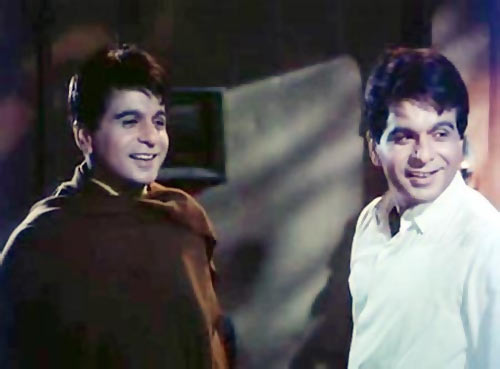
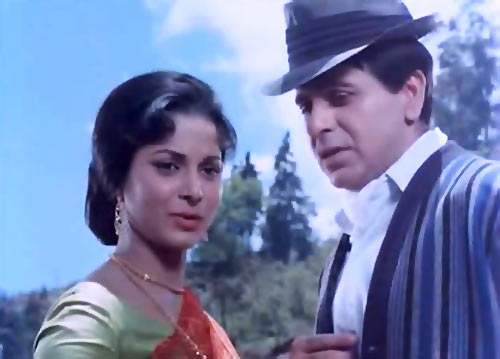
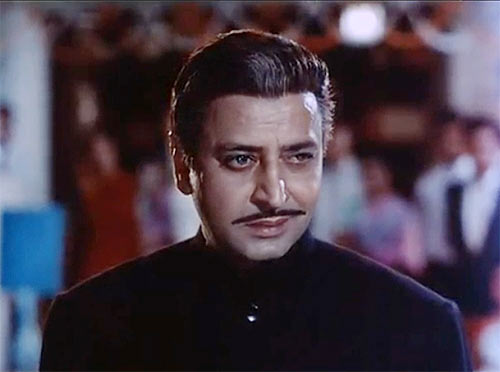

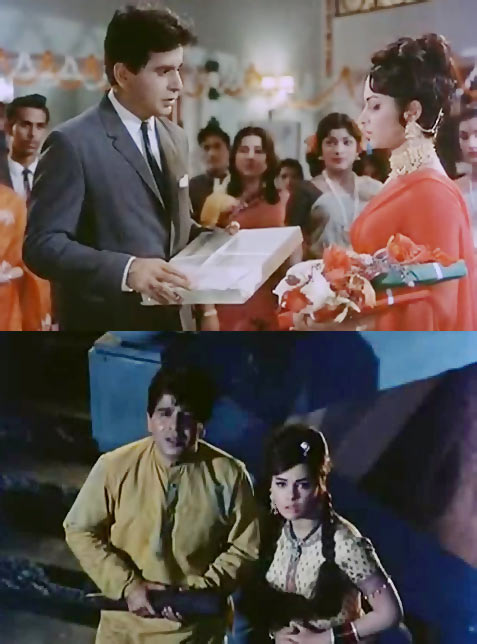
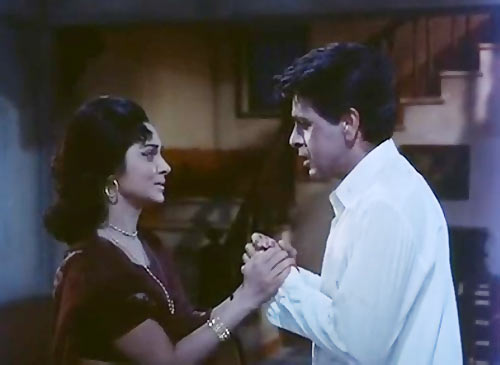
Comment
article